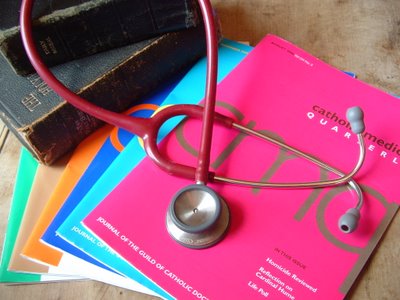 I have recently finished a four-month rotation in Psychiatry. I wanted to impart some of the things I learned from this, which have inspired me towards a career in this noble art. The specific area of work was a community based outreach service called 'Early Intervention'. This service is basically aimed at young people (16-35) who are experiencing psychotic symptoms for the first time. These kind of symptoms are common features of Schizophrenia, which is a syndrome prominent in the public conscious. However, not everyone understands this devastating illness, or how it can be managed, so I was privileged to be able to gain an insight.
I have recently finished a four-month rotation in Psychiatry. I wanted to impart some of the things I learned from this, which have inspired me towards a career in this noble art. The specific area of work was a community based outreach service called 'Early Intervention'. This service is basically aimed at young people (16-35) who are experiencing psychotic symptoms for the first time. These kind of symptoms are common features of Schizophrenia, which is a syndrome prominent in the public conscious. However, not everyone understands this devastating illness, or how it can be managed, so I was privileged to be able to gain an insight. Schizophrenia was a term first coined by Eugen Bleuler (1857-1939) in 1908. Prior to this, the condition was called 'Dementia Praecox', as assigned by the German Psychiatrist Emil Kraepelin (1856-1926) who introduced a distinctly clinical outlook to Psychiatry. Bleuler correctly realised that it was not a dementia, and also not exclusively confined to young people. His new term, 'Schizophrenia', was derived from the Greek term meaning 'Split mind'. There is a common misconception, perhaps stemming from this etymology, that it is a syndrome of split personality. This is false, and not to be confused with Dissociative Identity Disorder.
Schizophrenia was a term first coined by Eugen Bleuler (1857-1939) in 1908. Prior to this, the condition was called 'Dementia Praecox', as assigned by the German Psychiatrist Emil Kraepelin (1856-1926) who introduced a distinctly clinical outlook to Psychiatry. Bleuler correctly realised that it was not a dementia, and also not exclusively confined to young people. His new term, 'Schizophrenia', was derived from the Greek term meaning 'Split mind'. There is a common misconception, perhaps stemming from this etymology, that it is a syndrome of split personality. This is false, and not to be confused with Dissociative Identity Disorder.The sort of symptoms which Schizophrenia involves are hallucinations and delusions. Typically an individual will hear voices, talking in a derogatory manner about or to the subject. Sometimes the voices will give a running commentary on what the person is doing. Less commonly hallucinations can be visual, or in other modalities.
 An individual with Schizophrenia will often feel that their thoughts are not their own. They may believe that thoughts are being physically inserted into their head, or taken away, or that their thoughts are being broadcast for all to hear. Delusions often develop from these symptoms and can be quite complex, and reflect a fragmentation of their experience of reality. To be a delusion it has to be a false, unshakable belief which is out of keeping with their cultural context. Often these seem to be related to popular constructs around them. Sometimes they may have a religious content, other times about aliens, and quite commonly at the moment about government conspiracies. Particular to Schizophrenia, these delusions often contain contradictions, with a lack of logical consistency, and have an unpredictable series of actions which may flow from it. The Oxford textbook of Psychiatry(1), in relation to this, quotes Eugen Bleuler thus
An individual with Schizophrenia will often feel that their thoughts are not their own. They may believe that thoughts are being physically inserted into their head, or taken away, or that their thoughts are being broadcast for all to hear. Delusions often develop from these symptoms and can be quite complex, and reflect a fragmentation of their experience of reality. To be a delusion it has to be a false, unshakable belief which is out of keeping with their cultural context. Often these seem to be related to popular constructs around them. Sometimes they may have a religious content, other times about aliens, and quite commonly at the moment about government conspiracies. Particular to Schizophrenia, these delusions often contain contradictions, with a lack of logical consistency, and have an unpredictable series of actions which may flow from it. The Oxford textbook of Psychiatry(1), in relation to this, quotes Eugen Bleuler thus"Kings, Emperors, Popes, and Redeemers engage for the most part, in quite banal work, provided they still have any energy at all for activity".
The result of these is that affected individuals display bizarre, erratic behaviour. Their speech often becomes rambling and incoherent, as they exhibit a 'loosening of associations' in their thought processes. Negative symptoms, like depression, withdrawal and a lack of motivation often predominate. People around them become increasingly baffled and worried. Fortunately current anti-psychotic medication, and services to improve social functioning, can return people to a normal and fulfilling life. The diagnosis 'Schizophrenia' is less commonly used, especially early on, since it is difficult to predict the course of the illness, and patients do not necessarily benefit from having a stigmatising label applied to them.
This can all obviously be incredibly distressing. I write the above because I find it all very fascinating, and because it is so poorly understood, even within the medical profession. My work with Early Intervention has brought me in touch with all kinds of people from a wide range of demographics, but in this case all young, often around the age of 17 and going through stressful life adjustments.
 Perhaps another similarity with these young people is that many of them have smoked Cannabis heavily. It is difficult for people to understand what a serious problem this is, especially since it is a drug so commonly consumed at schools, colleges and universities. An initial study(2) suggested that those with a strong history of Cannabis use, especially in early adolescence, are up to 6 times more likely to develop the illness. Since about 1% of the population will suffer from psychosis at some point in their life, this is not a negligible risk. More importantly, those with the illness can relapse suddenly upon exposure to Cannabis, and it is often a factor in delayed recovery. This should come as no surprise, since Cannabis increases levels of Dopamine in the brain, which is the biochemical process believed to be most associated with Schizophrenia, and the target of most therapeutic drugs (which incidentally have much fewer side-effects than was previously the case).
Perhaps another similarity with these young people is that many of them have smoked Cannabis heavily. It is difficult for people to understand what a serious problem this is, especially since it is a drug so commonly consumed at schools, colleges and universities. An initial study(2) suggested that those with a strong history of Cannabis use, especially in early adolescence, are up to 6 times more likely to develop the illness. Since about 1% of the population will suffer from psychosis at some point in their life, this is not a negligible risk. More importantly, those with the illness can relapse suddenly upon exposure to Cannabis, and it is often a factor in delayed recovery. This should come as no surprise, since Cannabis increases levels of Dopamine in the brain, which is the biochemical process believed to be most associated with Schizophrenia, and the target of most therapeutic drugs (which incidentally have much fewer side-effects than was previously the case).It always astonishes me the sort of social pressures which impede the practice of Psychiatry. Rather than a noble and respected profession, it is often seen by outsiders as a threatening and arrogant speciality. In my experience Psychiatrists are the most thoughtful, friendly, and intuitive doctors around. Their communication skills are superb, and indeed have to be, since they are the only real diagnostic tools available. I see two social pressures to predominate: anti-Paternalism (and accompanying medical consumerism) and so-called human rights arguments. Perhaps I will expand upon these observations another time, but for now I just wanted to focus on the experience of mental illness, in particular one as devastating as psychosis. There is a tendency for people to view these patients with suspicion and apprehension, and to alienate them further. However, what they really need is to be valued and loved in the way Jesus instructed us.
 A great saint summed it up thus:
A great saint summed it up thus:When her mother reproached her for caring for the poor and sick at home, Saint Rose of Lima said to her: "When we serve the poor and the sick, we serve Jesus. We must not fail to help our neighbours, because in them we serve Jesus."Catechism of the Catholic Church 2449
We can therefore see in our brethren Christ himself, and be moved to compassion by hearing Christ say: "As long as you did it to one of these my least brethren, you did it to me." (St Matthew's Gospel 25:40)
Mental illnesses are like any other disease in that they have physical and psychological aetiology; we must not think they are due purely to social or spiritual factors, as important these are in any illness. We must certainly not think that something like psychosis is a manifestation of demonic activity; I hope very much that this sort of opinion is cast firmly aside. Yes, demonic possession does exist - but mental illness is something discrete and always to be excluded by a diocesan investigation. Ultimately though, amongst the indispensable drug treatment and psychological interventions, spiritual remedies will always be welcome. In a sense, Psychiatry is the one area of medicine where all components of the human being meet, and the scope is thus endless.
References:
1. Gelder M et al. Oxford Textbook of Psychiatry. Oxford University Press: 2000
2. Zammit S, Allebeck P et al. Self reported cannabis use as a risk factor for schizophrenia in Swedish conscripts of 1969: historical cohort study. BMJ 2002;325:1199


